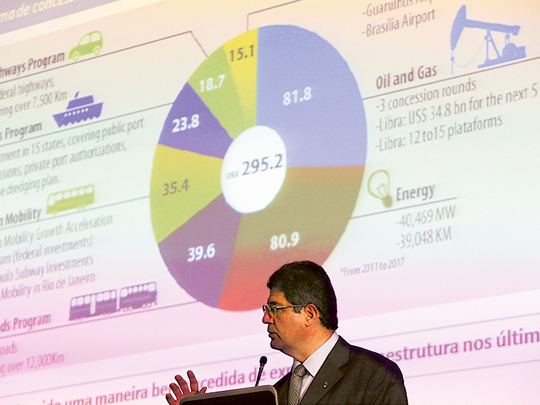
BRASILIA: Brazilian states and cities are scrambling to raise taxes and cut spending after years of excesses, nudging an already weak national economy closer to recession.
Growing budget deficits, the biggest in more than a decade, have prompted some states to temporarily suspend payments to suppliers and freeze billions of reais in services and infrastructure projects, from road maintenance to health-care facilities.
The measures rippling through rich and poor, big and small states mirror President Dilma Rousseff’s own efforts to regain credibility with investors at the federal level after years of lavish government spending and tax breaks for select industries.
While a return to fiscal rigour in states and cities may help Brazil keep its coveted investment grade credit rating, it could seriously hamper investment crucial for Latin America’s largest economy to avoid a painful recession this year.
States and cities posted a primary budget deficit of 7.8 billion reals (Dh10 billion, $2.7 billion) in 2014, the first since 1998. Twenty-one of Brazil’s 27 states saw payrolls as a percentage of net revenues rise in the past four years, and 17 are close or beyond a legal limit for their staffing bill.
States’ outstanding net debt grew by 21 per cent between 2010 and 2014 to nearly half a trillion reais, driven by a surge in public spending and federal government efforts to relax debt limits to increase investments.
To be sure, states haven’t replicated the reckless spending that triggered fiscal crises in the 1980s and 1990s. That traumatic period led Brazil to pass a landmark Fiscal Responsibility Law in 2000 that placed strict limits on the ability of states and cities to take on new debt without federal government approval.
While Rousseff’s government has agreed to some requests to ease those limits, ratings agencies say debt levels remain manageable.
Still, the belt-tightening could not come at a worse time for the economy, which is already on the brink of recession and could shrink as much as 2 per cent this year, according to recent market forecasts.
“This will certainly have an impact on activity and push the economy further into negative territory,” said Rafael Bistafa, economist with Sao Paulo-based consultancy Rosenberg. “But you can’t keep raising states’ debt limits. It is not sustainable.” Obliged to follow strict spending rules on health care, education and other essential services, states and cities have little option but to cut back on investments, public-finance expert Mansueto Almeida said.
State governors have sought to reassure voters that key projects will remain on schedule.
There have been no cuts to the budget for the 2016 Olympics in Rio de Janeiro and the state governor insists the city will be ready to host the event.
But analysts say many initiatives, such as a flagship project to build “pacification” police units in Rio’s slums, will need to be scaled back.
Fiscal discipline that limits services and wages could also fuel the same popular discontent that led to massive street protests in 2013 and rattled the government.
Earlier this month, the governor of the southern state of Parana backtracked on a series of tax hikes and tougher pension rules after teachers stormed the local assembly in protest.
Doctors and trash collectors in the capital Brasilia went on strike in January because of salary delays, but returned to work after they were paid. Teachers are threatening to prolong their strike if they are not paid late wages.
Spending by states and cities grew as salaries rose above already-high inflation and incumbent governors ramped up outlays ahead of last October’s elections.
Rousseff also encouraged states to bolster investments for last year’s soccer World Cup and to try to jump-start the stagnant economy.
“Last year’s elections left things a bit disordered,” said Daniela Brandazza, a senior director with Standard & Poor’s.
“But if the regional governments take this moment as an opportunity to reorganise their finances, we believe their possibilities in the medium and long terms are very good.” WASTEFUL SPENDING Brazil’s sluggish economic growth has capped tax revenues over the past few years and falling commodities prices dented royalty revenues. The plunge in oil prices will cost Rio de Janeiro state about 2.6 billion reais in revenues this year, governor Luiz Fernando de Souza said in a recent speech.
Brasilia, where there were 64,000 reais in state coffers at the start of the year, still has to pay an estimated 200 million reais in services related to the construction of a 1.6-billion real soccer stadium, said Renato Rainha, head of the Federal District’s Audits Court.
The stadium was built for the World Cup even though Brasilia has no team in Brazil’s premier soccer league.
With the economy stuck in a slump, raising taxes and fighting evasion appear to be the main sources of new revenues for states and cities this year.
They could also seek federal approval to seek additional financing from multilateral organisations such as the World Bank. However, that would put them at odds with Finance Minister Joaquim Levy, who has pledged to reduce Brazil’s overall public debt in coming years.
Last year, before Levy took office, Congress passed a bill authorising the federal government to reduce interest rates on states’ debt, thus freeing up lending room for some states and cities. The initiative was criticised by many analysts, and Levy has not yet changed the terms of any of the states’ obligations with the federal government.
“The real concern is the watering down of the fiscal transparency law that fixed the excesses of the past,” said Francisco Gil Castello Branco Neto with Contas Abertas, a group that monitors public spending.












